Nick Saban cut a figure of stoic intensity for 17 seasons on the sidelines of the Alabama Crimson Tide. With a singular focus, he delivered six national championships to the team’s rabid followers in Tuscaloosa, sending more than 100 players to the NFL in the process.
Add the national championship that Saban won at LSU before arriving at Alabama, and the coach’s seven national titles are more than any other college football coach in history.
Bill Belichick, a man of similarly stern demeanor, held the reins of the New England Patriots for even longer, spending 24 seasons with the team and winning six Super Bowls with quarterback Tom Brady under center. No head coach has ever won more Super Bowls.
The two men are often considered the greatest coaches in the history of college and professional football, respectively. So it represented quite the jolt to the football world when, in a span of 24 hours earlier this month, each stepped aside from their longtime positions.
Though he’s 72 years old, Saban’s retirement announcement came as a major surprise — the coach having given no prior indication that this would be his final season.
Belichick’s departure from New England had been the subject of speculation for months as the Patriots limped to a 4-13 record, their third losing season in the past four years. The coach indicated that ownership desired to move on, and he may yet coach again.
Neither team wasted any time replacing their legendary coaches. Alabama lured away Washington head coach Kalen DeBoer, while the Patriots promoted assistant coach Jerod Mayo.
Though DeBoer and Mayo certainly have large shoes to fill, many coaches following legendary predecessors have fared well, carrying on championship traditions and carving their own places in the history of the game.
Others, however, have fallen dreadfully short.
Here’s a look at some of the game’s greatest coaches, their accomplishments and what happened when they stepped aside from the cities and schools where they built their legacies.
Legendary College Football Coaches
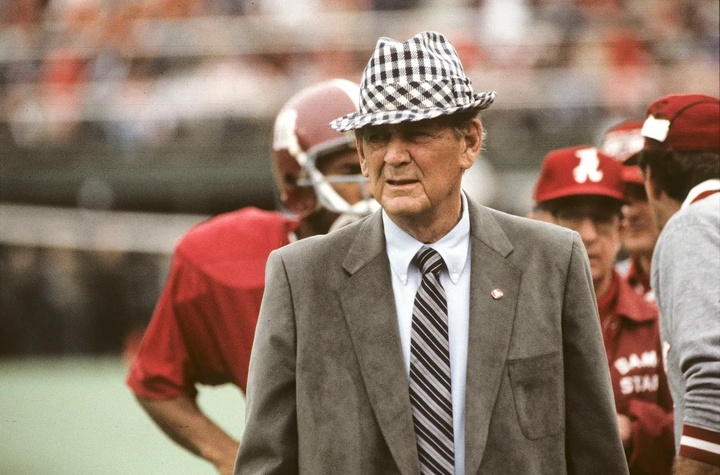
Paul “Bear” Bryant (Alabama, 1958-1982)
Record: 232–42–9 at Alabama
Championships: Six National Championships, 13 SEC Championships
Legacy: In his trademark, houndstooth cap, Bryant built a dynasty at Alabama, revolutionizing defense and influencing generations of coaches.
How His Successor Fared: Ray Perkins lasted just four seasons at Alabama, compiling a record of 32-15-1. The Crimson Tide’s 5-6 record in 1984 was the program’s first losing season since 1957, the year before Bryant arrived.
Knute Rockne (Notre Dame, 1918-1930)
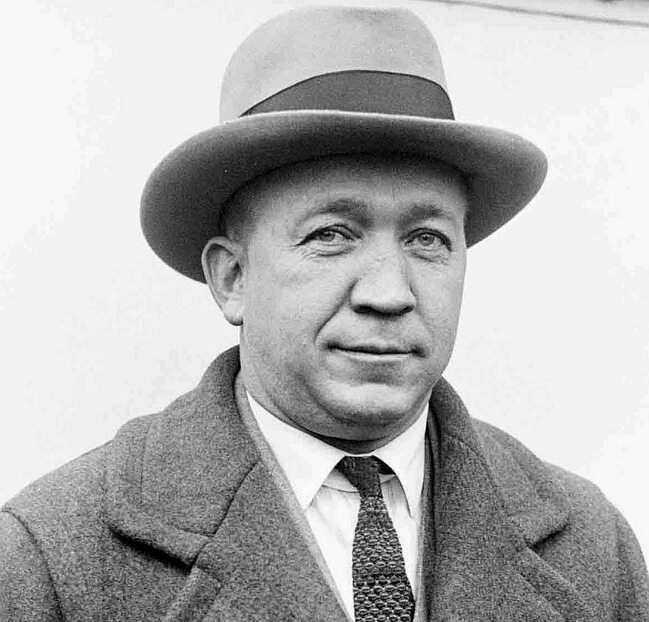
Source: Notre Dame Univerisity
Record: 13 seasons, 105-12-5 at Notre Dame
Championships: Three National Championships
Legacy: Regarded as “The Father of Modern Football,” Rockne pioneered single-wing offense and helped popularize the forward pass. He was inducted into the College Football Hall of Fame in 1951.
How His Successor Fared: Heartley William “Hunk” Anderson coached the Fighting Irish to a record of 16-9-2 in his three seasons in South Bend. Notre Dame returned to prominence a decade later, winning four national championships under coach Frank Leahy between 1943 and 1949.
Woody Hayes (Ohio State, 1951-1978)
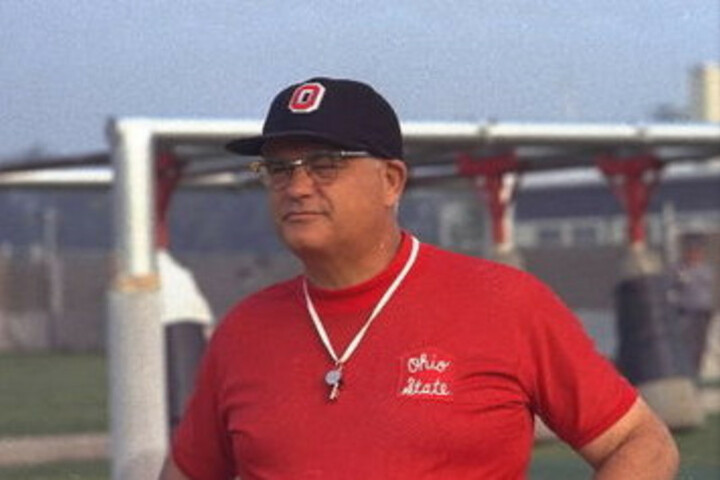
Source: Cleveland.com
Record: 28 seasons, 205–61–10 at Ohio State
Championships: Five National Championships, 13 Big Ten Championships
Legacy: Hayes’ ground-heavy offensive attack was referred to as “three yards and a cloud of dust.” He was a fiery coach and an intense sideline presence, and his teams had a 16-11-1 record against border rival Michigan.
How His Successor Fared: Earle Bruce maintained Hayes’ winning tradition, ranking No. 4 in the country in his first season. In nine years at Ohio State, Bruce led the team to a 81–26–1 and at least a share of four Big Ten titles.
Bobby Bowden (Florida State, 1976-2009)
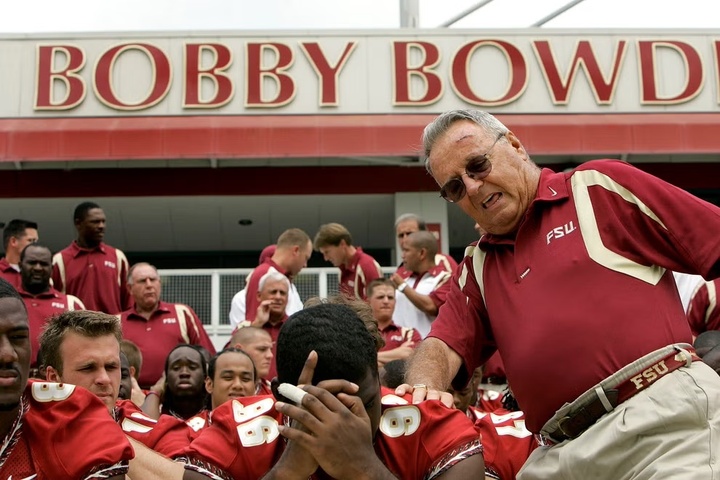
Source: AP2007
Record: 34 seasons, 304–97–4 at FSU
Championships: Two National Championships, 12 ACC Championships
Legacy: Florida State was not known as a football powerhouse prior to Bowden’s arrival. He changed the narrative, thanks to his offensive creativity, focus on recruiting and emphasis on academics. He was known for his warmth, humor and ability to connect with players.
How His Successor Fared: Jimbo Fisher, offensive coordinator under Bowden, took the reins and led the Seminoles to a record of 83-23 in eight seasons, including a national championship in 2013.
Joe Paterno (Penn State, 1966-2011)
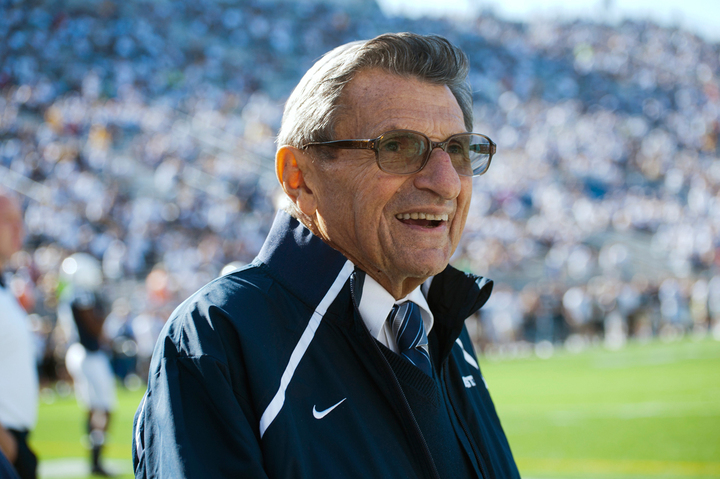
Source: pennstatelive via Flickr
Record: 46 seasons, 409-136-3 record, most wins in NCAA major college football history
Championships: Two National Championships, five Big Ten Championships
Legacy: Paterno won more games than any college coach in history over more than four decades at Penn State. Beloved for his dedication to players, academics and ethical conduct, his legacy was tarnished by his involvement in a scandal surrounding assistant coach Jerry Sandusky.
How His Successor Fared: Bill O’Brien coached the team through two unremarkable seasons, finishing with a record of 15-9 but helping navigate the program through the turmoil and upheaval following the Sandusky scandal.
Legendary NFL Coaches
Vince Lombardi (Green Bay Packers, 1959-1967)
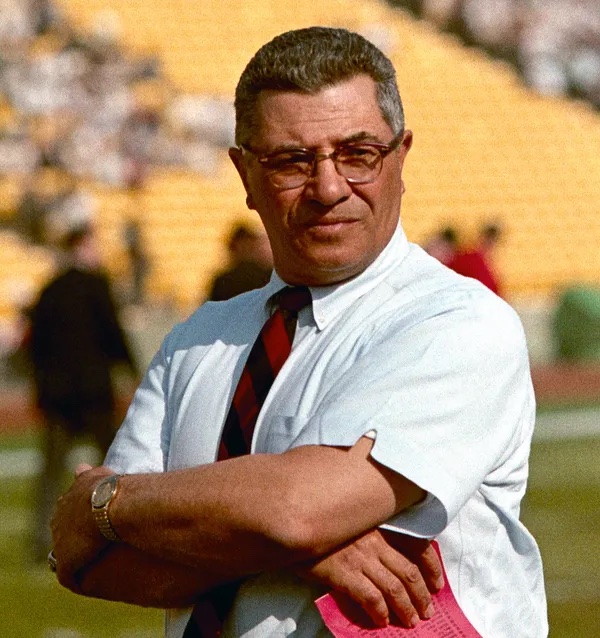
Source: Milwaukee Journal Sentenial
Record: 89-29-4
Championships: Three NFL Championships (including two Super Bowls)
Legacy: Lombardi defined “winning” in the NFL. His leadership, work ethic and offensive innovations — like the power sweep — transformed the Packers from a struggling team to a powerhouse. He left the Packers after the 1967 season, and though he coached one season in Washington in 1969, it is in Green Bay where his legend and legacy resides.
How His Successor Fared: Phil Bengtson struggled to fill Lombardi’s shoes, coaching the Packers to a 20-21-1 record over three seasons, never finishing higher than third in their division.
Tom Landry (Dallas Cowboys, 1960-1988)
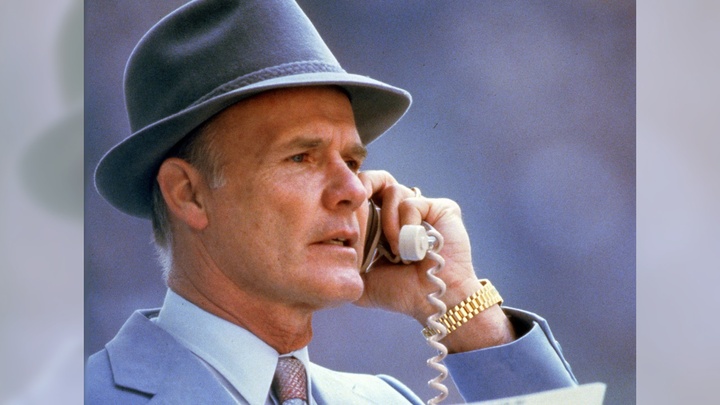
Source: David Durochik/Associated Press
Record: 250-162-6
Championships: Two Super Bowls
Legacy: Known for pacing the sidelines in a suit and fedora, Landry established the “Doomsday Defense,” revolutionizing defensive schemes with blitzing and zone coverage. He led the Cowboys to five NFC championships and was known for his stoicism and discipline.
Successor: Two years after winning a collegiate national championship at the University of Miami, Jimmy Johnson succeeded Landry in Dallas. In 1989, his first year, he finished 1-15, but the team regrouped quickly. Johnson’s Cowboys won the Super Bowl in 1992 and 1993.
Don Shula (Miami Dolphins, 1970-1995)
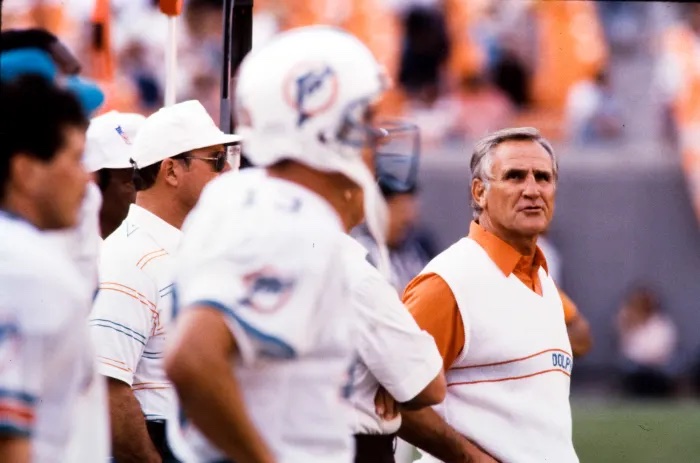
Source: Miami Dolphins
Record: 257-133-2 in Miami, 328-156-6 overall, Most wins in NFL history
Championships: Two NFL Championships (including the NFL’s only perfect season in 1972)
Legacy: Shula’s disciplined approach and focus on fundamentals built a dominant Dolphins team. He emphasized running the ball and a strong defense, creating the “No-Name Defense.”
How His Successor Fared: Jimmy Johnson, who also succeeded Tom Landry in Dallas, took over in Miami after Shula’s retirement. Though the Dolphins made the playoffs in three of his four seasons in Miami, Johnson never replicated Shula’s success or even his own success in Dallas.
Chuck Noll (Pittsburgh Steelers, 1969-1991)
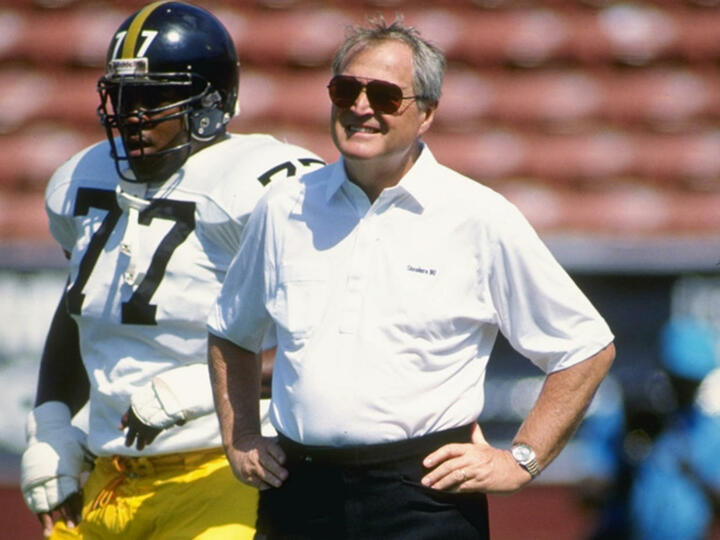
Source: Ken Levine /Allsport
Record: 193-148-1
Championships: Four Super Bowls
Legacy: Noll built the “Steel Curtain” defense, one of the most feared units in NFL history. He also drafted and developed legendary players like Terry Bradshaw, “Mean” Joe Green and Jack Lambert.
How His Successor Fared: Bill Cowher took over and promptly coached the Steelers for the next 15 seasons, compiling a record of 149-90-1. Cowher’s Steelers won the Super Bowl in 2005 before he retired after the 2006 season.
Bill Walsh (San Francisco 49ers, 1979-1989)
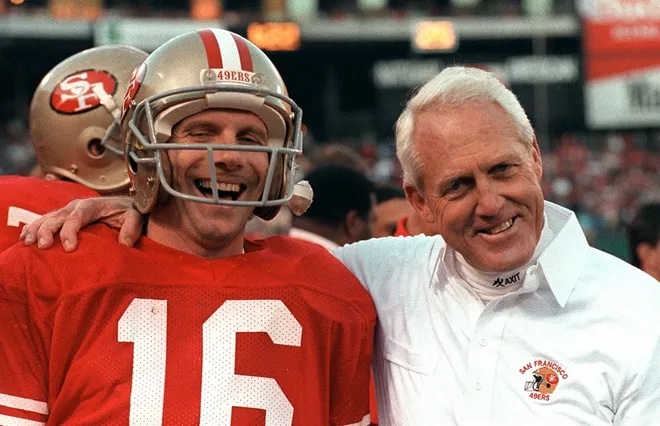
Source: The Gainsville Sun
Record: 92-59-1
Championships: Three Super Bowls
Legacy: Walsh revolutionized the game with his West Coast offense, based on precision passing and timing. He developed quarterbacks like Joe Montana and Steve Young, and his offensive schemes influenced a generation of coaches.
How His Successor Fared: George Seifert seamlessly continued Walsh’s offensive philosophy and won the Super Bowl with the 49ers in his first season after succeeding Walsh. He won a second Super Bowl with San Francisco five years later.
![]()






